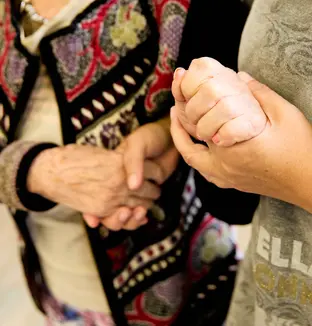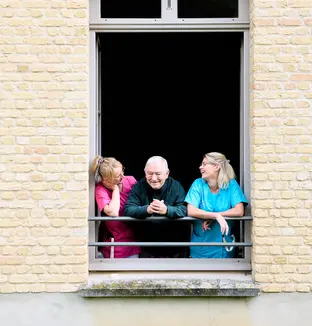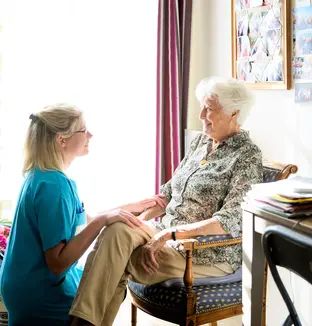Alzheimer's: what if prevention were the key?
While drug treatments are struggling to deliver on their promises, one thing is becoming clear: Alzheimer's disease can best be combated through prevention and non-drug interventions.
Professor Pierre Krolak-Salmon, medical director of emeis, advocates the effectiveness and benefits of a healthy lifestyle and comprehensive support for patients and their loved ones.
Lecanemab: partial drug solutions deemed insufficient
The French High Authority for Health has not recommended treatment with lecanemab, an antibody targeting the amyloid protein that plays a major role in Alzheimer's disease, considering its clinical efficacy to be insufficient in relation to its potential annual cost. Furthermore, some people with Alzheimer's disease also have vascular or Lewy body lesions, which are not targeted by this antibody. "This treatment could one day be used for young patients in the very early stages of the disease with purely amyloid lesions," says Professor Pierre Krolak-Salmon. The conclusion is clear: in the absence of a cure, the priority lies elsewhere.

Alzheimer's: towards increasingly early diagnosis?
Today, Alzheimer's disease can be diagnosed as soon as the first symptoms appear, even if they are very mild. Thanks in particular to subtle memory tests, general practitioners can detect the early signs in patients who are concerned about their forgetfulness. In case of doubt, if the symptoms seem abnormal, the patient is referred by their general practitioner or another healthcare professional to a neurologist or geriatrician for a memory consultation and further tests (biological assessment and brain imaging). In the future, blood markers could even be used to detect the first lesions, as is already the case for other diseases. "But be careful: systematic screening only makes sense if it is accompanied by effective treatment," he cautions.

A healthy lifestyle: a powerful shield against this type of disease
Alongside dynamic research into promising drugs, Professor Krolak-Salmon advocates for everyday prevention based on three inseparable pillars:
- Physical activity, the benefits of which are proven: reducing the risk of cognitive decline by 30% is possible by exercising regularly, a little every day.
- Social connection, a natural stimulant for the brain: conversations, laughter and daily interactions preserve cognitive function and morale.
- A balanced, varied diet, preferably organic and locally sourced, enriched with vitamin D to compensate for deficiencies that are common after the age of 50.
"These levers not only act on amyloid plaques, but on all mechanisms of neurodegeneration, and even other types of diseases such as cardiovascular disease and cancer. Their strength? Lasting benefits, without risk, and valid even after diagnosis," he points out.
Non-drug therapies also play a key role: music therapy to calm agitation, animal-assisted therapy to combat isolation, or even sessions in nature to stimulate the senses and cognitive functions. "These approaches reduce behavioural disorders – aggression, hallucinations – often better than medication."

Living with Alzheimer's disease or a related disorder: the crucial role of carers
Professor Krolak-Salmon's message is unequivocal: "The diagnosis is not a death sentence. I have followed many patients who, despite advanced disorders, have maintained an excellent quality of life for years, he says. One woman, unable to speak or recognise the faces of her loved ones, still smiled, went out and attended my lectures, accompanied by her husband." His advice? "Don't isolate yourself, seek advice, and continue to live as normally as possible. With a loving support network and appropriate care, it is possible to have a good quality of life despite the disease."
However, maintaining quality of life also depends on a fragile balance, that of loved ones, who are often forgotten by the healthcare system. Yet they pay a heavy price: "They are at increased risk of depression, cardiovascular disease and even cancer," warns the specialist. To support them, emeis and various associations (depending on the country) offer various solutions:
- Support groups to break isolation and share practical solutions.
- Training courses on managing behavioural disorders: "Understanding, for example, that aggression or apathy are symptoms, not whims, changes everything."
- Respite stays: "A weekend at an emeis facility for the patient means 48 hours of breathing space for the carer."

What if we could all age differently thanks to everyone?
In 2025, the priority is no longer to cure, but to delay the onset of debilitating symptoms: those that turn old age into dependence. "At 85, for example, gaining five years without symptoms is huge: it means perhaps dying a 'good death', without having experienced too much cognitive decline or severe disability," emphasises Prof. Krolak-Salmon.
At emeis, patients are offered stays in clinics or nursing homes to help them live better, longer. The programme includes everything that can help delay the onset of severe stages of the disease: social interactions, activities, memory workshops (cognitive games, sensory stimulation) and personalised assessments to help them adopt good habits in terms of nutrition and physical activity.

For more information :
- Visit Alzheimer's Association
